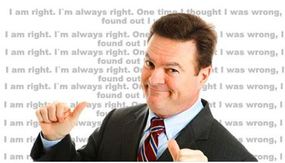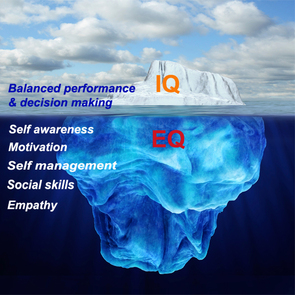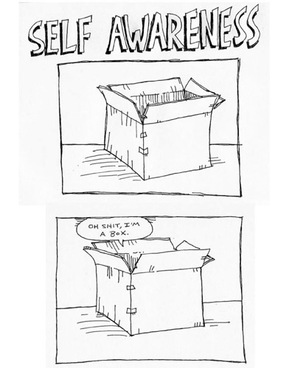 Years ago, I was asked to deliver a class at University of Chicago's Booth School of Business. One of the questions on a survey distributed in advance of the class was, "Please provide three words that describe you." One of the responses, to my amusement and surprise: "Smarter than you." During the class, I posed several trying situational leadership scenarios about surmounting obstacles and being successful, to which one student answered every time that he would have an MBA from the best finance program in the country, and that would be all he needed to excel in the business world.
Years ago, I was asked to deliver a class at University of Chicago's Booth School of Business. One of the questions on a survey distributed in advance of the class was, "Please provide three words that describe you." One of the responses, to my amusement and surprise: "Smarter than you." During the class, I posed several trying situational leadership scenarios about surmounting obstacles and being successful, to which one student answered every time that he would have an MBA from the best finance program in the country, and that would be all he needed to excel in the business world.
Of course, his M.O. was not credible. I wish it was. If so, the world would be much easier to navigate. But we all know a handful of people like this, with enough letters after their names to fill a can of alphabet soup, and in my view, they do so at their own peril.
But alas, it does appear that employment trends are espousing a similar philosophy. A recent study by Millennial Branding and Elance-oDesk.com reveals the following:
1.Fifty-five percent of HR managers are biased toward hard skills when hiring. Twenty-one percent focus more on personality.
2.Forty-five percent of HR managers expect to become even more hard skills-focused in 10 years. Only eleven percent expect to become more personality-focused.
While this change in focus is understandable given the increasingly results-oriented mindset of U.S. companies, studies like the above are dangerous in that they lead people to swing the personal development pendulum too far toward obtaining hard skills. Hard skills can be developed anywhere fairly quickly, and focusing too much in this area leads to a capability profile that competes against lower-cost workers worldwide. I believe that this is the true reason why wage gains have been fairly non-existent over the past two decades. Economically, the world is flat, and the U.S. is still at the high end of the global wage scale.
While many things have changed, what hasn't is your greatest career differentiator over the long term, providing you the greatest wage gains--soft skills (a.k.a., emotional intelligence).
 1.Emotional Intelligence (EQ): refers to a set of emotional and social skills that influence the way individual contributors perceive and express themselves, develop and maintain social relationships, cope with challenges, and use emotional information in an effective and meaningful way. Daniel Goleman defines these soft skills as an array of skills and characteristics that drive leadership performance focusing on self awareness, self-management, social awareness and relationship management.
1.Emotional Intelligence (EQ): refers to a set of emotional and social skills that influence the way individual contributors perceive and express themselves, develop and maintain social relationships, cope with challenges, and use emotional information in an effective and meaningful way. Daniel Goleman defines these soft skills as an array of skills and characteristics that drive leadership performance focusing on self awareness, self-management, social awareness and relationship management.
2. Intelligence (IQ): Hard skills are directly related to an individual's smarts/intelligence. They are taught in school. Examples are accounting, finance, computer programming, and physics.
"The more your success on the job depends on relating to people -- whether in sales, as a team member, or as a leader -- the more emotional intelligence matters. A high-enough IQ is necessary, but not enough, to be a star performer." -- Daniel Goleman
I see the tradeoff between hard and soft skills to be most at play in professional capacities such as accounting, finance and law, where people are trained and hired for their extreme analytical capabilities (left brain-logical center). Every day, they are using logic and defined parameters to create desired results. And although they need to know the rules of accounting or finance, they eventually become responsible for building their book of business, selling to clients and managing and leading teams. Selling to clients for example, challenges these professionals because there are not defined parameters or a set of rules for being effective in securing new business. Selling and communication tactics vary from client to client. These responsibilities require a leader to tap into soft skills (or their right brain-emotional center) to effectively communicate, influence, or be empathetic. I would say my most common query from potential clients is from those who were trailblazers in client work, were promoted to partner, and have hit a brick wall just at the moment when they are realizing the ultimate goal to which most in the industry aspire.
Are soft skills innate, or can they be trained?
Emotionally intelligent qualities are definitely innate and can be refined. But they also can be learned. Soft skills are mainly learned and polished by placing oneself in stretch situations. Emotionally intelligent leaders learn from moments of turmoil and excellence.
1.Have an accurate picture of your strengths and weaknesses. Leverage assessments and models to enhance your leadership effectiveness and deepen your understanding of how to more resourcefully tackle challenges coming from a position of power. Having a coach for an outside perspective helps in bolstering awareness immeasurably.
2.Develop practices around self-awareness - This can be accomplished by staying tuned to superiors and peers for feedback, meditating and journaling daily about your personal and work experiences, and being as relationship-focused as possible at work while still allotting time to excel at the work tasks at hand. Doing so will promote a greater understanding of your interactions with others and how to better navigate politics and potential professional opportunities that might otherwise go ignored.
3.Practice gratitude - As new-agey as this sounds, the exercise of gratitude helps you to focus on what you are doing that is working so that you can more easily identify and capitalize upon your strengths. Focusing on the positive aspects of your life also helps you to become more resilient, increasing your ability to stay calm and focused when stress is at its highest.
While it appears quite clear that hard skills are the ticket to employment in today's marketplace, I truly fear what this new-found focus may bring. After all, preserving a balanced focus that includes soft skills is one of the great drivers in keeping the U.S. a leader in the global economy. For those without a job, by all means do what you have to do to secure one, but once you have, remember to nurture those soft skills to maximize your long-term earning potential.
______________________________________________________________
Laura Berger is available as a speaker, workshop facilitator, and private coach. For more information, write to info@berdeogroup.com or visit BerdeoGroup
Enjoyed this article? Check out Are You Thriving or Surviving?
Want to discover how emotionally intelligent you are? Start by taking a quick and fun emotional intelligence quiz.

